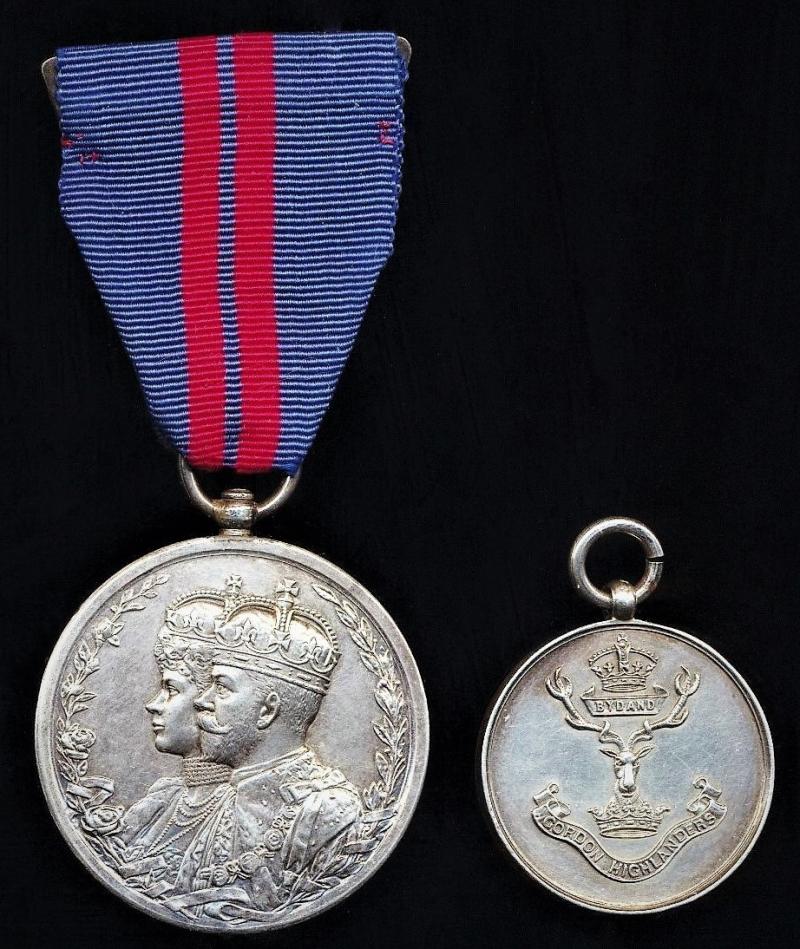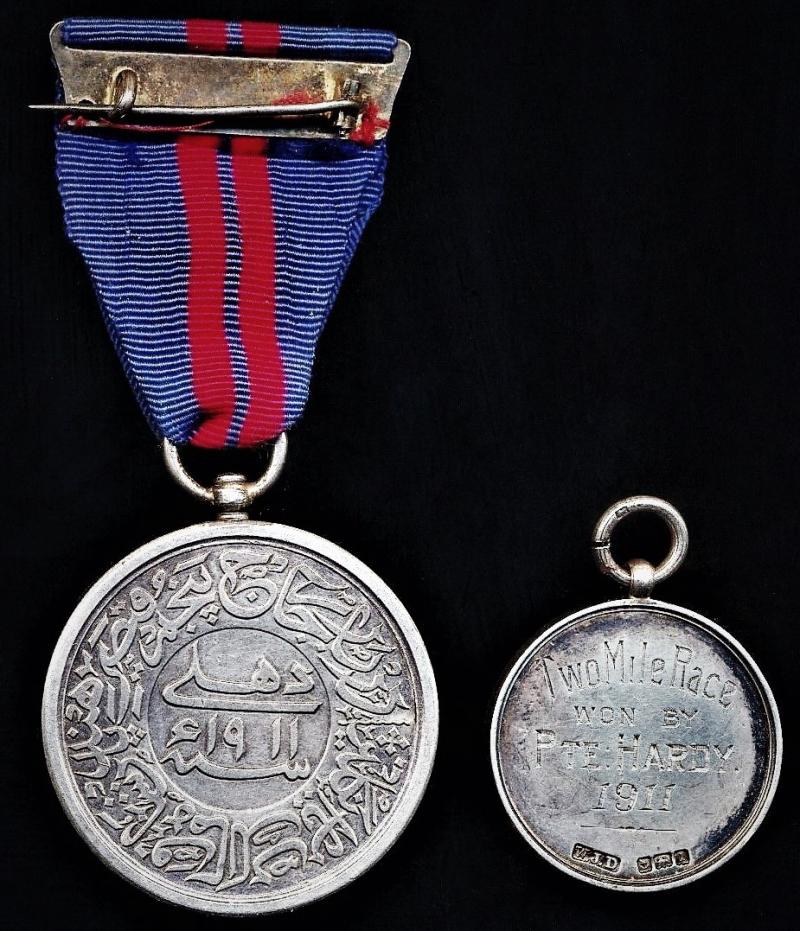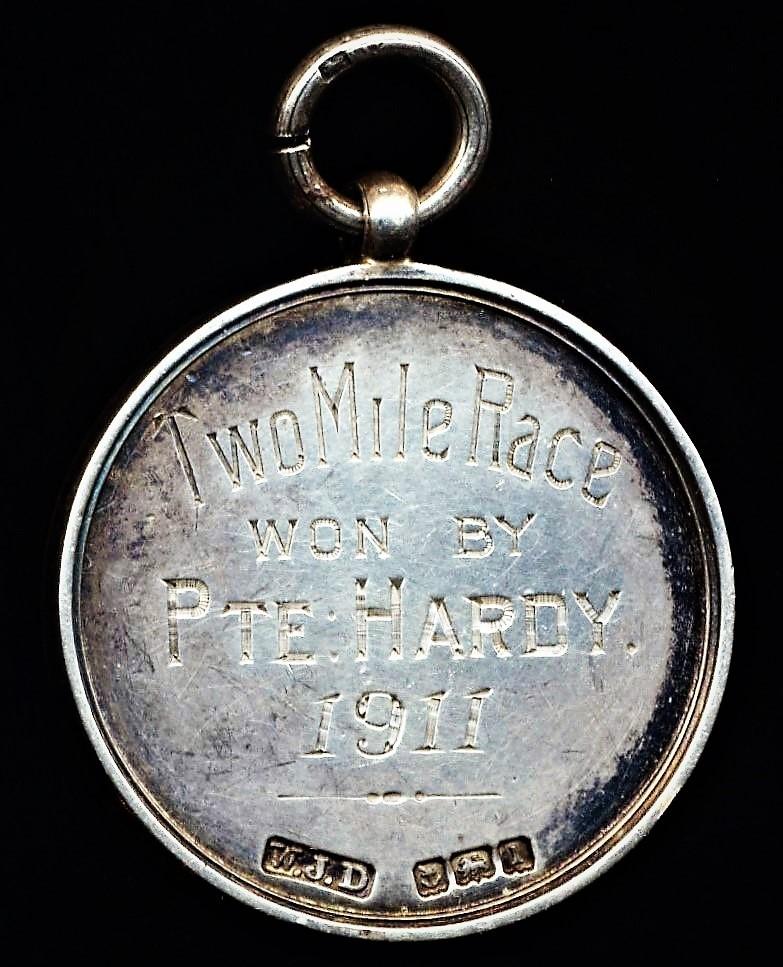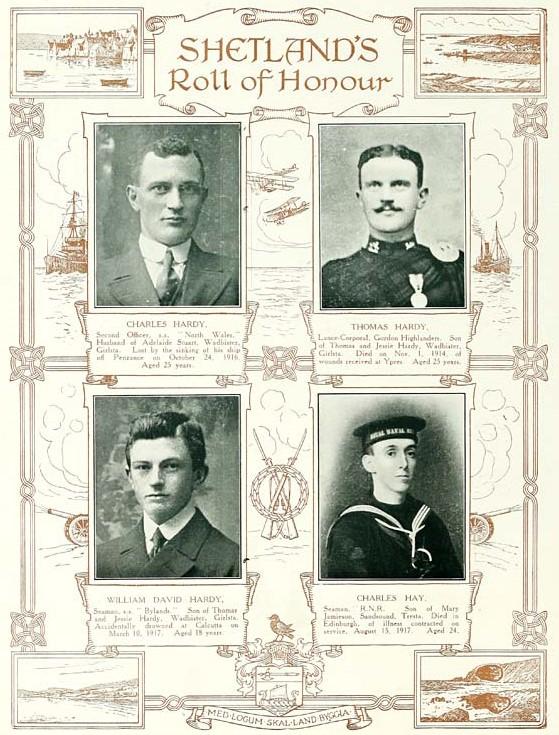A 'Shetland Islander' Died-of-Wounds 1914, Delhi Durbar & Regimental Medal pair: Private Thomas Hardy, 2nd Battalion Gordon Highlanders
- Delhi Durbar Medal 1911. Silver issue
- Gordon Highlanders Medal (Two Mile Race Won By Pte Hardy 1911)
Died-of-Wounds: 10017 Private Thomas Hardy, 2nd Battalion Gordon Highlanders is confirmed 'Died-of-Wounds', at the 3rd Field Ambulance, Ypres, Belgium, on, 1 November 1914
Important: Reference the National Census Regimental Returns for the 1911 National Census, there were only 3 x soldiers with surname Hardy, serving with the regular battalions of the Gordon Highlanders. No 10017 Private Thomas Hardy (age 23) was serving overseas in India with the 2nd Battalion Gordon Highlander and was the only man to receive a Delhi Durbar Medal. The other two men, were William Hardy (35) and Robert John Hardy (19 - later POW in Great War) who were both serving with 1st Battalion Gordon Highlanders in England
Medal(s) verification: The recipients entitlement to the Delhi Durbar Medal, as well as the other Great War medals the recipient qualified for, are here all cited per the respective regimental rolls shown below:
- Delhi Durbar Medal 1911. Silver issue: Ref WO 100/400
- 1914 Star with dated clasp: Ref WO 329/2475 (Medal Index Card records the clasp)
- British War Medal. Silver issue: Ref WO 329/1655
- Interallied Victory Medal: Ref WO 329/1655
Thomas Hardy, eldest son of Thomas Hardy & Janet Hardy (nee Arthur) was a native of Tingwall, Shetland Islands, Scotland, where he was born, on 24 November 1888. Thomas had 4 x siblings, comprising: younger sister, Margaret Jessie Hardy (b. 1901) and three younger brothers, vis; Charles Hardy (b. 1891), Laurence William Hardy (b. 1898) & William David Hardy (b. 1899). All of the Hardy brothers served in the Great War, but three sadly lost their lives, with only Laurence surviving to become a Master Mariner - who were sadly, like Thomas, all killed during the Great War - and a younger sister, Margaret Jessie Hardy (b. 1901). Thomas enlisted in the British Army, in April 1906 (No, 10016 William Turner Tocher - the immediate enlistment before Thomas - another teenager (18 years 10 months of age), who was a native of, Peterhead, Aberdeenshire, Scotland, had enlisted on 14 April 1906). After completion of his basic training at the regimental depot of the Gordon Highlanders, located at Castlehill Barracks, Aberdeen, Thomas was posted overseas to the 2nd Battalion Gordon Highlanders - then serving in British India. While serving in India, Thomas was present at the Delhi Durbar of 1911, subsequently being selected as one of the recipients of the Durbar Medal that was issued to commemorate the event.
On the outbreak of the Great War, 2/Gordons were serving at Cairo, Egypt, and were at once mobilized for embarkation to England, from where the battalion, together with Thomas Hard. entered theatre of war, France, when they disembarked at Thomas, together with the rest of his battalion disembarked at, the Belgian port of Zeebrugge on 7 October 1914.
After their disembarkation the 2nd Battalion Gordon Highlanders, were quickly advance to the front-line, and saw their baptism of fire at the First Battle of Ypres in October-November 1914. The 2nd Gordons were in action on the Menin Road on 23rd, where Drummer Kenny won the first Victoria Cross of the war for the regiment. Six days later a massive attack was launched by the Germans which resulted in a day long battle. The battalion mounted a number of effective counter-attacks but had to fall back on Gheluvelt where a second Victoria Cross, a posthumous award, was earned by Captain Brooke who recaptured an important trench to prevent the German breakthrough. During the first battel of Ypres, 2nd Gordons lost 23 officers and more than 600 killed or wounded, including Private Thomas Hardy
The supreme sacrifices made by the sons of Thomas & Janet Hardy, was widely reported in the Shetland Islands, to the extent that such was the acclaim the family had, that the mother Janet Hardy, was invited to unveil the Great War War Memorial in Lerwick - an honour that she initially declined, but later accepted.
With courtesy and thanks to the Shetland Museum Archives, we quote the following article by Arthur Johnson, from their website:
Quote,
The eleventh hour of the eleventh day of the eleventh month, the time of the armistice that ended the Great War. Remembrance in November has been the UK’s biggest act of commemoration for a century now. This year’s ceremony at the Cenotaph was different with Covid spacing, the monarch in a mask, and no crowds. Restrictions on meetings meant many had to contemplate sacrifice without company. The lonely path of loss.
The main ceremony in Shetland is at the County War Memorial at Hillhead in Lerwick. Commemoration needs a focus. In 1920, just a couple of years after the armistice, there was no major remembrance ceremony. After much deliberation and thought Shetland got a war memorial on January 6, 1924. It isn’t quite a century old yet.
A lot of war memorials in Britain were unveiled by women who had lost sons, a way to honour the dead, and the grief of their mothers. Three women in Shetland lost three sons. Mrs Elizabeth Mann had died by the time of the memorial, Mrs Charlotte Gear didn’t feel well enough. Mrs Janet Hardy also lost three boys. Thomas, one of Shetland’s few regular soldiers died in France in 1914, Charles died in 1916, his ship torpedoed, and William was accidentally drowned in 1917. A son and a daughter survived.
Mrs Hardy initially refused, citing “bad health in the loss of my three sons,” in a letter. It isn’t surprising that she didn’t feel up to it – the stress of love and sadness, and how often a home offers reminders of what has gone. In the end she changed her mind. Her daughter, Margaret Hardy, was there. Her husband too, wearing his sons’ medals. A large crowd saw her take a few steps forward and pull aside a flag, then she laid a wreath below the panel with her boys’ names.
The newspaper reports didn’t say anything about what Mrs Hardy felt. Probably, it wasn’t something they felt proper to ask about, or print. As Shetlanders would say, an ill laek ta do. Private things remained private. The onlookers though, with their own burdens of grief, would have known that she was undertaking something deeply difficult.
Unquote.
The Delhi Durbar Medal fitted with it's original silk riband suspended from a silver or white metal mounting brooch, and as-worn by the recipient. The reverse of the mounting brooch complete with its hinged pin and clasp fittings - a named portrait of the recipient in uniform, wearing his Durbar Medal is illustrated in the book 'Shetland's Roll of Honour'.
A poignant medal pair of considerable local Shetland historical interest, to a Shetlander who had served at the 'Great Durbar' of 1911, in Delhi, India, and who in 1914 made the supreme sacrifice
Condition: GVF
Code: 22803







